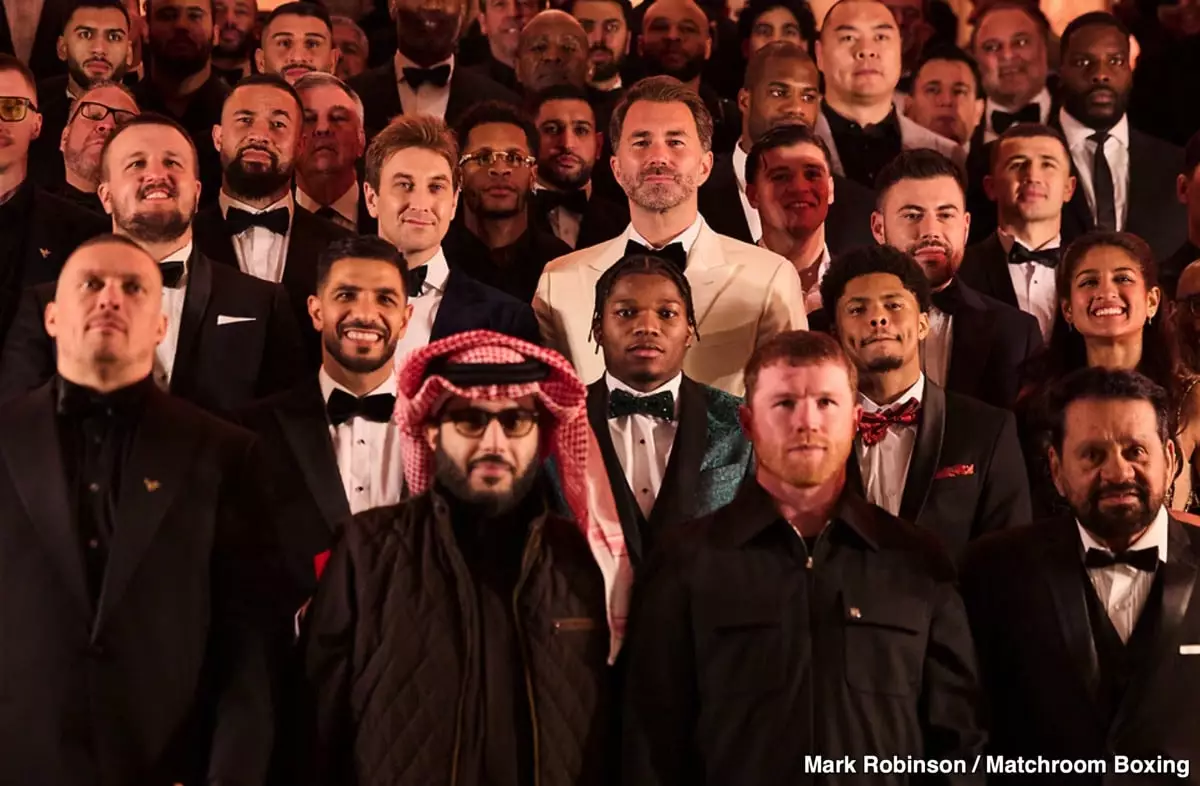In an unexpected turn of events, Gervonta “Tank” Davis recently referred to a photograph featuring several prominent fighters alongside Turki Alalshikh as reminiscent of “devil s**t.” This invocation of dark imagery brought to light not only his personal views but also the broader implications of how fighters present themselves. With pundits discussing the allegiance of athletes in high-stakes environments, such statements suggest a deep-seated discomfort with the potentially exploitative nature of the sport today. This sentiment resonates on social media, where fans have likened the fighters’ solemn expressions and formal attire to that of brainwashed disciples in a cult-like scenario.
The visual composition of the photo further amplifies this perception. Dressed in bow ties against a dim backdrop, the fighters evoke an aura that hints at manipulation by external entities. Critics have noted that the entire setting feels curated, with only missing elements like black pajama bottoms and a jug of Kool-Aid, traditionally associated with infamous cult activities. This scrutiny raises important questions about authenticity, integrity, and the pressures athletes face in representing themselves in a way that appeals to sponsors or promoters.
Concerns Over Controversial Decisions
Davis’s commentary extends beyond mere aesthetics; it speaks to a larger concern over the integrity of boxing events occurring in Riyadh, Saudi Arabia. He expressed reluctance to engage in fights there, referring specifically to a series of controversial decisions made during recent bouts. While he refrained from naming particular instances, the boxing community has been buzzing about questionable outcomes, notably with fights like Carlos Adames versus Hamzah Sheeraz and Artur Beterbiev against Dmitry Bivol, stirring doubt about the legitimacy of the officiating.
In voicing his apprehensions, Davis encapsulates a widely shared skepticism about the transparency of the sport, especially in areas like Saudi Arabia, where emerging markets are rapidly changing the landscape of boxing. His insights suggest that he believes the integrity of matches is at stake, and there might be ulterior motives influencing fight outcomes.
The Price of Compromise
Moreover, Davis’s statements provoke thought regarding the moral compromises athletes are faced with within the realm of sports. The notion of “selling one’s soul” alludes to a troubling dynamic, where financial incentives may overshadow the values of sportsmanship and fairness. The undercurrents of his criticism imply that pursuing wealth and fame in locations known for their controversial fight operations could lead to compromised ethics that might ultimately tarnish a fighter’s legacy.
Degenerating into age-old questions about who really benefits in these high-profile matches, Davis’s perspective serves as a societal critique of athletes who may unwittingly become part of a manipulated narrative. As more fighters find themselves in similar positions, the boxing community must consider how such images and experiences will shape the future identity of professional boxing.
Gervonta Davis’s observations open the floor to necessary discussions about integrity, ethics, and the soul of boxing as it navigates through a rapidly evolving and often murky landscape. Fans, fighters, and promoters alike must reflect on the direction in which the sport is headed and recognize the importance of preserving its core values for posterity.


Leave a Reply